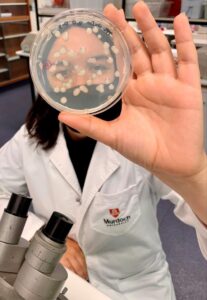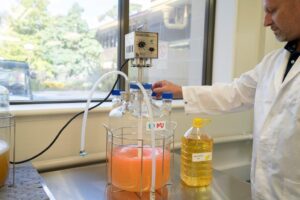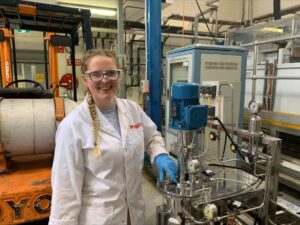
Bioplastics Innovation Hub to end plastic waste
CSIRO, Australia’s national science agency, and Murdoch University have launched The Bioplastics Innovation Hub. This $8 million collaboration will work with industry partners to develop a new generation of 100% compostable plastic.
The Bioplastics Innovation Hub aims to revolutionise plastic packaging by developing biologically derived plastic that can break down in compost, land, or water.
Dr Andy Whiteley, CSIRO Research Program Director, said the Hub aims to bring together experts in microbiology, molecular genetics, synthetic biology, biochemical engineering, advanced manufacturing and circular economy by translating advancements in bioplastics research to real-world applications.
“Our primary focus is the development of 100% compostable, bio-derived packaging for use as sprays, films, bottles, caps, and wrappers which are engineered to fully break down in compost, land and aquatic environments,” said Dr Whiteley.

With global concerns over plastic pollution and fossil fuel depletion driving an increased demand for compostable bioplastics, the Hub will equip the plastics industry with the tools and expertise required to manufacture materials and continue to drive a plastic waste green economy.
The first key focus area will be a co-investment with WA-based biotechnology company Ecopha Biotech Pty Ltd to develop a new process for producing water bottles using compostable bioplastics derived from food industry waste.
Murdoch University Deputy Vice-Chancellor Research & Innovation Professor Peter Eastwood said managing the growing plastic waste crisis required innovative technological solutions, including bioplastics.
“Together with CSIRO, Murdoch University will fast-track the production of novel compostable bioplastic and introduce a green plastic to the market, which will significantly minimise the requirement for non-sustainable plastic production,” Professor Eastwood said.
“We also aim to assist industry in establishing an advanced biomanufacturing sector to commercialise compostable bioplastics that meet the manufacturing design needs and certification standards for 100% biodegradation.
“The outcomes of this project will boost Australia’s capability for commercial production of compostable bioplastics. In particular, the Hub meets the sector priority of increasing technical leadership of Australian manufacturing.”
The Bioplastics Innovation Hub is based at Murdoch University’s main campus in Perth, Western Australia. An important outcome will be training the next-generation workforce in advanced biomanufacturing.

The Bioplastics Innovation Hub aligns with CSIRO’s aim of reducing plastic waste entering the Australian environment by 80% by 2030. This initiative supports Australia’s commitment to the United Nations Global Treaty on plastic pollution and the Australian government’s National Plastics Plan.
“Ecopha Biotech’s role is to ensure that the new ideas and technologies developed from the Hub are successfully commercialised, contributing to a more sustainable future for Australia.
“Through the Bioplastics Innovation Hub, we are focused on developing bioplastics that will help address the plastic waste problem in Australia and globally.
“Success has many partners, and the Bioplastics Innovation Hub shows that. The success we’re seeing is because of the hard work of all the stakeholders – the research teams at Murdoch University, the scientific expertise of CSIRO, innovators, students, entrepreneurs, policymakers, and government bodies. Together, we’re making a real difference for a more sustainable future.”
“It is critical to address the growing problem of plastic waste and reduce its environmental footprint. This needs a systems approach, and we are developing a broad range of scientific and technological solutions for the entire plastics supply chain to support government and industry initiatives, eliminate litter and divert plastic waste into a resource to build Australia’s circular economy.
“We know that no one single intervention or approach will be able to effect the change that’s needed, so bioderived and compostable plastics are an important part of the solution.”
